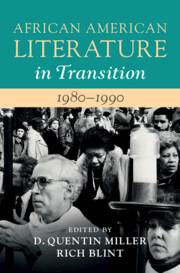Book contents
- African American Literature in Transition, 1980–1990
- African American Literature in Transition
- African American Literature in Transition, 1980–1990
- Copyright page
- Contents
- Notes on Contributors
- Preface
- Introduction
- Part I The Expanding Canon
- 1 Those Dazzling African American Women Writers of the 1980s
- 2 Innovations and Institutions in African American Poetry of the 1980s
- 3 Wideman’s Family Stories and the Carceral Archipelago
- 4 A Queer Reckoning for Black Masculinity
- 5 August Wilson’s Time and History’s Black Bottom
- Part II New Directions/New Literary Forms
- Part III Global Connections
- Index
3 - Wideman’s Family Stories and the Carceral Archipelago
from Part I - The Expanding Canon
Published online by Cambridge University Press: 02 February 2023
- African American Literature in Transition, 1980–1990
- African American Literature in Transition
- African American Literature in Transition, 1980–1990
- Copyright page
- Contents
- Notes on Contributors
- Preface
- Introduction
- Part I The Expanding Canon
- 1 Those Dazzling African American Women Writers of the 1980s
- 2 Innovations and Institutions in African American Poetry of the 1980s
- 3 Wideman’s Family Stories and the Carceral Archipelago
- 4 A Queer Reckoning for Black Masculinity
- 5 August Wilson’s Time and History’s Black Bottom
- Part II New Directions/New Literary Forms
- Part III Global Connections
- Index
Summary
The rise in prison populations in the 1980s coupled with the silencing of the voices of those in prison compromised the visibility of some Black writers.Writers who were not incarcerated began to write about the prison experience, especially in terms of its effect on families.Although that trend can be seen earlier and later, the neoconservative 1980s catalyzed the need for a new approach to Black prison writing that would enable prisoners’ stories to be told by family members.At the vanguard of that movement is John Edgar Wideman whose willingness to tell the story of his incarcerated brother changed the trajectory of contemporary African American literature and its intersection with prison writing.This chapter utilizes the lens of Michel Foucault’s concept of the carceral archipelago in order to advance a broader literary/cultural critique.Foucault enables us to extend Wideman’s inquiry outward from prison into a series of institutions designed to preserve and promote the idea of racial hierarchy despite mythological national claims of opportunity, democracy, equality, and equal justice for all well after the abolition of slavery and the end of legal segregation.
Keywords
- Type
- Chapter
- Information
- African American Literature in Transition, 1980–1990 , pp. 56 - 76Publisher: Cambridge University PressPrint publication year: 2023

